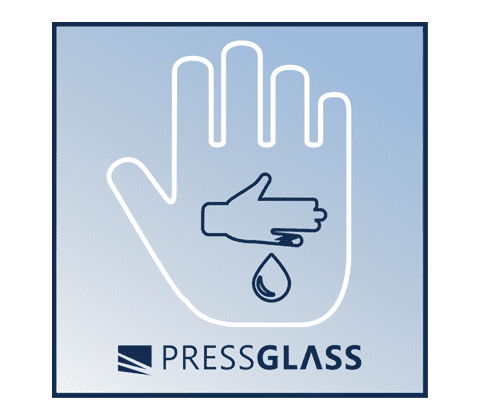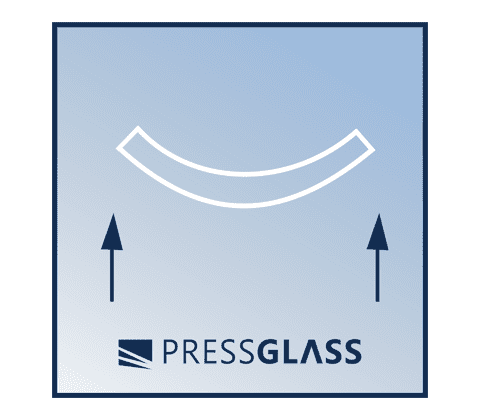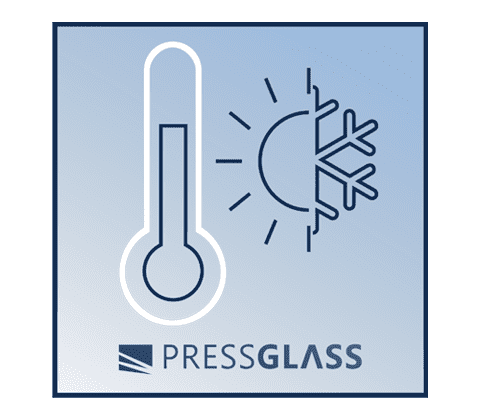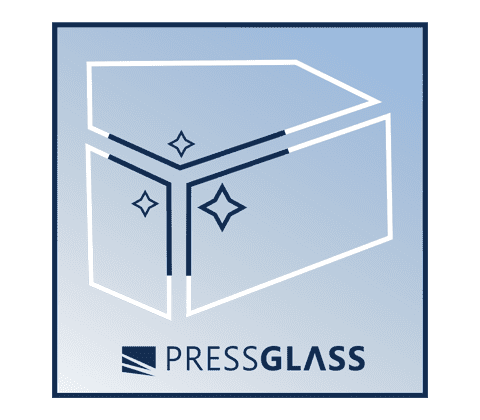Toughened glass
Glass is naturally fragile. Thanks to the toughening process, the internal stresses within its structure change, which results in an increase in its bending strength. Toughened glass means safety. When it breaks, the pane is shattered into tiny pieces with blunt edges. This characteristic makes toughened glass particularly suited for use in highly sensitive places, with a high risk of being broken or exposed to high insolation – which means a big increase of internal thermal stresses.
Advantages
Protection against injury from breaking glass
In order to prevent such danger PRESS GLASS proposes 2 types of solutions:
- laminated safety glass, which thanks to its construction remains in its frame or bolted elements after the impact of a blow or smashing
- hardened glass ESG, which after being hit breaks into small particles of blunt edges
All toughened glass units on offer fulfil the norms of PN-EN 12600 specifications.
High level of resistance to bending
Architects are still searching for more aesthetic materials which are used to make supporting elements. Glass constructions are also becoming more commonly used as supporting elements. Glass fins, glass stairs, glass floors are only a few examples of such applications. All these possibilities came into being thanks to the development of methods regarding tempering glass. From this onwards construction elements made out of monolithic glass can be put under significant strain of bending and pressurizing.
Resistant to thermal shock
Glass is naturally fragile. Thanks to the hardening process, the internal stresses within its structure change, which results in an increase in its bending strength. This characteristic makes hardened glass particularly suitable for use in highly sensitive places, with a high risk of being broken or exposed to high insolation – which means a big increase of internal thermal stresses.
Market offer includes glass:
| Toughening type |
Glass thickness [mm] |
Minimum dimensions [mm] |
Maximum dimensions [mm] T-thermofloat |
| Standard | 4 | 100×250 | 1700×2500 (T:1500×2500) |
| 5 | 100×250 | 2000 × 3000 (C: 2000 × 3000) | |
| 6-19 | 100×250 | 3200×7000 |
Directional hardering
An inseparable component of the toughening process is the so-called glass waviness. PRESS GLASS informs all customers that this effect can occur, in order to be fair in service. The waviness effect is of particular importance if glass panes are assembled in building facades, especially with big glazed surfaces.
It is visualised by a distortion of the view reflected in the facade. To decrease the distortion effect of a reflected picture, it is suggested that directional toughening is made. It means that e.g. in the case of toughening along the height, waviness will occur perpendicularly to this dimension.
Heat strengthened glass
Heat strengthened glass differs from the toughened glass by the kind of breaking netting, which occurs during glass panel damage. Due to its breaking characteristic, the panel assembled in the frame stays there after the damage, which protects against injury.
Thanks to this feature, TVG is starting to become interesting as an alternative for toughened. However, heat strengthened glass is not counted among the types of safety glass.
| Glass thickness [mm] T-Thermofloat |
Minimum dimensions [mm] |
Maximum dimensions [mm] |
| 4 | 200×450 | 1700×2500 (T:1500×2500) |
| 5 | 200×450 | 2000 × 3000 (T: 2000 × 3000) |
| 6-12 (T:6-10) | 200×450 | 3200×7000 |
Heat Soak Test
The manufacturing process of float glass is done by the smelting of separate ingredients. Molten glass is poured out in special baths, and then formed to the required thickness in a floating process on the surface of melted tin, where it cools down. There exists a risk during this process that inclusions of nickel sulfide will occur. This phenomenon causes an increase of internal stress in the hardened glass, which could finally lead to self-breaking.
Even though this phenomenon occurs extremely rarely, one must allow for this possibility. It is suggested that the toughened glass is put under pre-heating process, during which the glass panes which have pollution content are eliminated from the shipment. PRESS GLASS Company offers the possibility of carrying out an extra glass check by means of the Heat Soak Test method.
Machining of edges
Depending on the customer’s request, before starting the toughening process, the glass must undergo the machining process i.e. cutting, drilling, grinding or grinding and polishing together. Safety glass which is tempered, undergoes checking according to the standard EN 12150- 1. Hardened safety glass produced by PRESS GLASS can not undergo further machining.
All requirements have to be presented together with the order for tempered glass. If there is no additional description all hardened glass panes up to 8mm in thickness are produced by PRESS GLASS with blunt edges (it is included in the price). Glass panes which are thicker than 8 mm have matt grinded edges (grinding is not included in the price and should be added to the price of tempered glass).
Movies
Tempering of glass
Verification of hardened glass by HST
We constantly modify our manufacturing processes and change habits to limit the negative effect on the environment.
In order to facilitate the changes, we have adopted ISO 14001, the worldwide management system for environmental protection.

